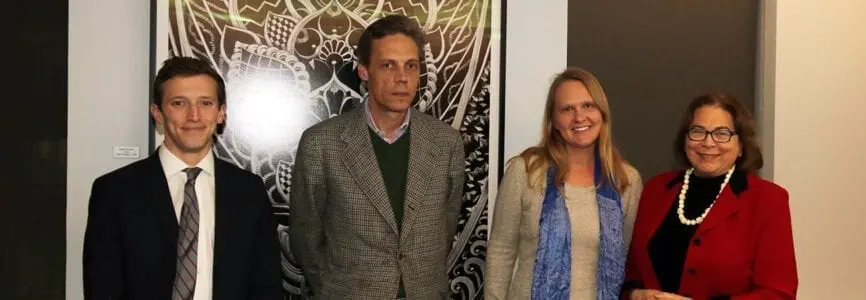Hastings Center News
The Hastings Center Celebrates Outstanding Journalists
Three journalists received The Hastings Center Awards for Excellence in Journalism on Ethics and Reprogenetics. The awards were presented at an event in New York City on December 6 that celebrated the role of journalists in helping the public understand the science of heredity and the power of genetic and reproductive technologies.
The keynote speaker was Carl Zimmer, New York Times columnist and author of the acclaimed new book, She Has Her Mother’s Laugh.
The first place award went to Antonio Regalado (second from left) for his article “A New Way to Reproduce,” published in MIT Technology Review, which explores the scientific possibilities and ethical challenges of creating artificial sperm and egg cells in the laboratory. In his remarks, Regalado discussed his longstanding coverage of genetic technologies, including his experience just two weeks earlier breaking the news about the Chinese scientist who claims to have created the world’s first gene-edited babies.
Runners-up were Amber Dance (second from right) for “Better Beings?”, published in Nature Biotechnology, which raises societal and ethical questions that should be addressed before we consider creating genetically modified babies; and Andrew Joseph (far left) for “A Baby with a Diseases Gene or No Baby at All: Genetic Testing of Embryos Creates an Ethical Morass,” published in Stat, which grapples with the ethical dilemmas of implanting embryos with genetic variants that could lead to a disease such as cancer.
The recipients were selected by an independent committee of journalists and a scientist. The first place award is $6,000 and the other awards are $3,000 each.
The awards recognized journalism that not only explained the science of reprogenetic technologies – including preimplantation genetic diagnosis, prenatal genetic testing, and gene editing — and addressed concerns about safety and efficacy, but also engaged broader philosophical questions, such as how these technologies should be deployed to promote human well-being. The awards are part of The Hastings Center’s project on gene editing and human flourishing, supported by the John Templeton Foundation.
Antonio Regalado is the senior editor for biomedicine at MIT Technology Review. Previously, he wrote about science, technology, and politics in Latin America for Science and other publications. From 2000 to 2009, he was the science reporter at the Wall Street Journal and later a foreign correspondent.
Amber Dance is a freelance science writer based in Southern California. She contributes to publications including PNAS Front Matter, The Scientist, and Nature. After earning a doctorate in biology, she studied journalism because she wanted to write about her broad interests in science and share her enthusiasm with readers.
Andrew Joseph is a general assignment reporter for STAT. He previously worked for the San Antonio Express-News and the San Francisco Chronicle. He has covered everything from crime to health policy.
Watch a video of the talks.

